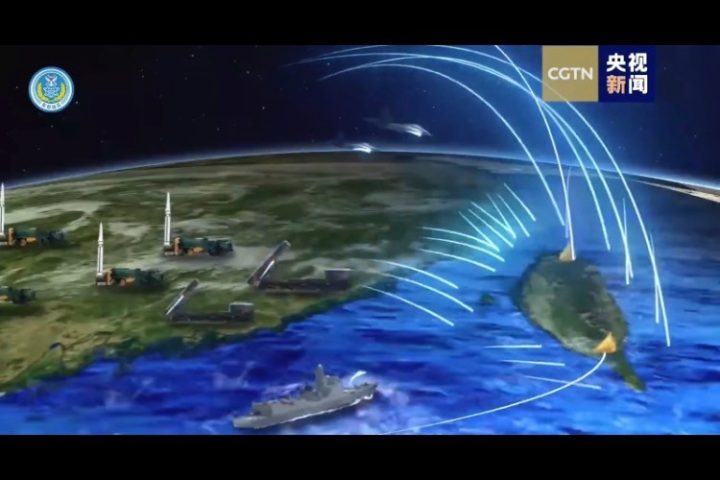
On Monday, China declared that peace in the Taiwan Strait and Taiwanese independence were “mutually exclusive,” as its military announced it had “successfully completed” exercises around the island after three days of war games.
“Taiwan independence and Taiwan Strait peace and stability are mutually exclusive things,” Chinese Foreign Ministry spokesman Wang Wenbin told a regular briefing, elaborating, “If we want to protect peace and stability in the Taiwan Strait, we must firmly oppose any form of Taiwan independence separatism.”
Ending its military drills around Taiwan, China stated it had tested integrated military capabilities under actual combat conditions, having conducted precision strikes and blockading Taiwan. China also stated that its military had “comprehensively tested” the capabilities of multiple units.
“The troops in the theater are ready to fight all the time and can fight at any time, resolutely crushing any form of Taiwan independence separatism and foreign interference,” the Eastern Theater Command of the People’s Liberation Army (PLA) said.
In response, Taiwan’s Foreign Ministry slammed China for threatening “peace and stability.”
Taiwan will not stop boosting combat preparedness and it will continue to monitor China’s missile force and movements of China’s Shandong aircraft carrier, the island’s Defense Ministry proclaimed.
China declared three days of drills on Saturday, after Taiwanese President Tsai Ing-wen met U.S. House Speaker Kevin McCarthy in Los Angeles. Upon her return to Taipei, Tsai also welcomed a U.S. congressional delegation over the Easter weekend.
The communist regime of Beijing deems Taiwan to be a breakaway province to be reunified with the mainland, by force if necessary. In turn, Taiwan’s government has dismissed China’s claims.
According to Chinese state television, aircraft such as nuclear-capable H-6 bombers armed with live missiles, as well as warships, conducted drills to “form a multi-directional island-encompassing blockade situation.”
“In the Taiwan Strait, the north-west and south-west of Taiwan and the waters east of Taiwan, (Chinese forces) took the initiative to attack, giving full play to their performance advantages, flexibly maneuvering to seize favorable positions, and advancing at high speed to deter opponents,” the report said.
China’s state-controlled Global Times newspaper quoted research fellow Zhao Xiaozhuo of the PLA’s Academy of Military Sciences as claiming that the PLA is practicing striking key military targets, including airfields and other buildings, during the drills.
Moreover, China’s Eastern Theater Command said the aircraft carrier Shandong participated in combat patrols as well, displaying fighters taking off from its deck.
In a short video published on its WeChat account, the Eastern Theater Command portrayed an H-6 bomber flying in what it claimed was the skies north of Taiwan.
“The missiles are in good condition,” an unidentified voice stated, as the video disclosed images from the cockpit.
“Start the fire control radar, lock on the target,” another voice says, depicting images of a missile under the aircraft’s wing.
Subsequently, the video depicted a pilot preparing the fire-control button and pressing the button for what it characterized as a simulated attack.
Since last week, Taiwan has been keeping tabs on the Shandong in the Pacific Ocean.
On Monday, Taiwan’s Defense Ministry also unveiled a map of the activities of Chinese air forces over the previous 24 hours, revealing four carrier-based Chinese J-15 fighters operating over the Pacific Ocean to Taiwan’s east.
The ministry added that it had detected 91 military aircraft and 12 ships around Taiwan as of 6:00 p.m. on Monday. Besides, the ministry also stated that the Shandong carrier group was conducting drills in the Western Pacific.
China’s military drills were on par with the communist state’s reprisals in 2022 after then-House Speaker Nancy Pelosi visited Taiwan, the island’s Foreign Minister Joseph Wu told Bloomberg. “If you compare the two sets of military drills, I will say the one in August last year [was] more intense,” Wu said. “So altogether, it was a more serious one at the time, but this time around, if you look at the intensity of their air threat or naval threat against Taiwan, I think it’s similar to what we saw at the time,” Wu said, as the PLA staged a third day of exercises.
Also, Wu lambasted Beijing for finding “excuses” to stage military exercises, warning that such acts were unacceptable.
“We need to prevent China from having the illusion that they can take Taiwan over quickly,” he said. “And therefore we need to speed up Taiwan’s preparedness and we’ve been doing that.”
Wu elaborated that France’s Senate and National Assembly have expressed their support for Taiwan, with some lawmakers planning to visit Taiwan “very soon.” Taiwan’s government will “check with them to see what kind of additional support we would need,” Wu said.
The French delegation is poised to visit Taiwan on April 16, one French official, who would be part of the group, revealed. When asked by the media on April 10 to comment on the plan, press officers at the French National Assembly and Senate did not immediately reply, as the day was Easter Monday, a public holiday in France.
This visit, if it materializes, would come after French President Emmanuel Macron said in an interview with Politico and Les Echos that Europe should avoid being involved in any potential clash between the United States and China over Taiwan.
“The worse thing would be to think that we Europeans must become followers on this topic and take our cue from the US agenda and a Chinese overreaction,” Macron said.
Macron had visited Beijing last week and laid out a more friendly tone in France’s ties with China than what the U.S. has encouraged. In December 2021, French lawmakers also visited Taiwan.
“The French government has been very vocal in supporting peace and stability across the Taiwan Strait. And they also oppose any unilateral change of status quo,” Wu declared.
“The French government has also been conducting freedom of navigation operations in this part of the world. So all these kinds of actions are actually being supported by Taiwan or appreciated by Taiwan.”
Additionally, Japan’s Defense Ministry acknowledged that the Shandong conducted air operations in waters close to Japan’s Okinawa islands on Sunday.
Between Friday and Sunday, jet fighters and helicopters took off from and landed on the carrier 120 times. Furthermore, one carrier, three other warships, and a support vessel hovered within 230 kilometers of Japan’s Miyako island, the ministry divulged.
Japan has been following China’s military drills around Taiwan “with great interest,” Chief Cabinet Secretary Hirokazu Matsuno said.
“The importance of peace and stability in the Taiwan Strait is not only important for the security of Japan, but also for the stability of the international community as a whole,” he added.
With Okinawa being home to a key U.S. air force base, Japan has long been worried about China’s military activities in the area, given the proximity of the southern Japanese islands to Taiwan.
Last August, when China conducted war games to protest Pelosi’s to Taipei, Chinese missiles entered Japan’s exclusive economic zone.
Meanwhile, life in Taiwan has continued unabated, with no apparent signs of panic and with civilian flights operating as usual.
“Most normal people probably aren’t afraid, with the main reason being that everyone thinks that China will certainly not start a war,” said retiree and former soldier Tang Pao-hsiung, 78.
Taiwan’s stock market also dismissed the cross-strait animosities, with its benchmark index up around 0.2 percent early on Monday afternoon.



